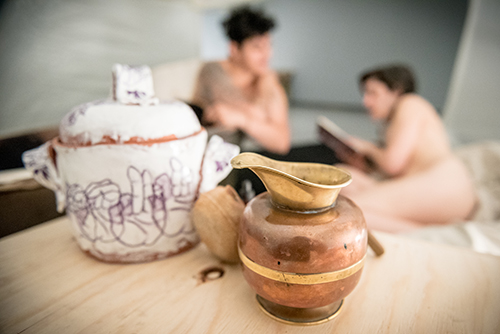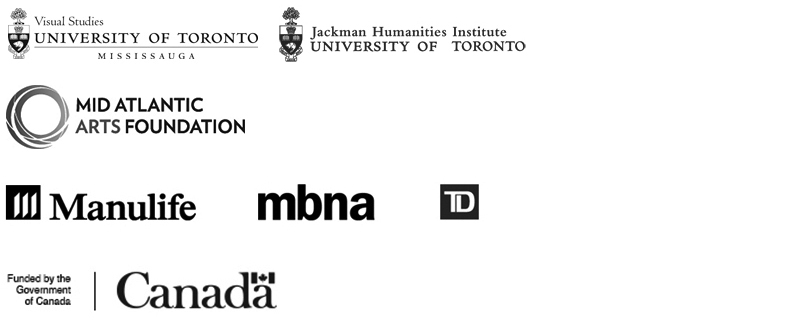
November 20–December 9, 2017
Presented as part of Circuit 3: Infrastructures and Aesthetics of Mutual Aid, Take Care
Download the Circuit 3 micropublication featuring project descriptions, artist biographies, and full colour illustrations throughout.

As part of Radiodress’s ongoing research around the queer body as a material site of resonance and empathy, MKV: Credit River Immersion acknowledges the physical toll that social justice work, migration, and climate change takes on marginalized bodies. Basing MKV upon the Jewish ritual bath ceremony of mikvah, the artist queers the traditional process, leaning towards an embodied and multi-dimensional spirituality. Traditionally, the mikvah bather is naked and immersed in water that comes from a natural source. The Shomeret, or guide, sits beside them and offers prayers suited to the purpose of their immersion. MKV: Credit River Immersion incorporates a localized awareness of the colonial footprint on our local water sources, and, in line with the mikvah tradition, some of the water is gathered from melted snow or rain around the gallery site.
Radiodress and MKV participants will connect with the waters of the nearby Credit River, outline their goals for the ceremony, and select the materials with which they wish to immerse themselves, possibly including saliva, tears, pee, menstrual blood, sweat, ejaculate, injectable hormones, medications, salt, rain water, snow, or other bodily fluids of their choice. Ultimately, each participant will take a private bath, in the gallery space, while Radiodress offers specific words to guide their attention towards healing and transition. Together, they decide how Radiodress’s presence as a guide will be manifest—either in person, in the gallery, or remotely, through radio communication. During the ceremony, participants reflect upon a personal change they are going through, which could include working through gender transitions, dealing with questions of fertility, or coping with the struggles of aging, illness, and death.
MKV: Credit River Immersion is part of a larger project within the Jewish world to re-inscribe the often misunderstood and patriarchal practice of the mikvah ceremony. Here Radiodress is curious about the ways in which critical queer and trans Jews both change and evolve Jewish traditions and play a role in proposals for human interconnection, or “inter-being,” a term taken up in Buddhist and mindfulness practices. Radiodress is interested in how non-normative bodies can offer alternatives to homonationalist impulses—impulses that subject LGBTQ2S people to the usual violence of capitalism, colonialism, and militarism.
Through participatory artworks in public space, Radiodress asks how erased and invisible knowledge(s) might inform a new era of social governance, with queer and trans people at the forefront of this change. Working with what Sara Ahmed describes as “queer orientations,” [1] Radiodress explores how private and public performance can shift the ways in which performers and audiences stand, sit, lie, and exist in space with others, including the spatial and temporal experience of being underwater. MKV: Credit River Immersion offers a comforting and transformative marker of shifting circumstances for queer- and trans-identified people, while suggesting that “queer orientations” have much to offer civic life.
[1] Sara Ahmed, Queer Phenomenology: Orientations, Objects, Others (Durham, NC: Duke University Press, 2006).
Dear Comrades, Lovers, Friends, Kin;
I'd like to invite you to participate in MKV: Credit River Immersion, organized by appointment. MKV is a ritual bath, built inside the Blackwood Gallery’s e|gallery space, in the CCT building. The Waters contain a mix of elements that come from Planet Earth and our sacred bodies. I will be guiding participants in this co-created experience of healing, as part of the Blackwood Gallery’s expansive exhibition and program series, Take Care.
I offer this ceremony to all queer and trans identified folks, as well as our beloved allies, with priority given to BIPOC identified and folx with disabilities. Appointments are available for booking Mondays, Fridays, and Saturdays from November 20th through December 9th, from 11am to 4pm. Appointments involve some travelling, water gathering, talking, co-creating and bathing. The bath itself is completely private and the bathing space is fully heated. You are welcome to invite others to witness or participate in your immersion if you choose.
MKV and Healing Justice
MKV is my queer, gender fluid version of the beautiful and ancient Jewish tradition of ritual bathing, Mikvah. The Waters surround you through any passage or change. They welcome you just as you are in this moment. They communicate with you about your next steps, your self-care, and they remind you of the cosmic vibrations your body is a part of. The Waters are traditionally understood to be the womb of the Divine. Yes, even patriarchal traditions can centre the Divine Feminine, if we know where to look. Come find out where s/he/they be.
Immersion in sacred water can assist with moving through the particular challenges our sacred journeys contain. MKV is designed to help participants with:
- movement through gender changes
- preparation for and recovery from surgery
- healing from sexual and physical trauma
- dealing with the violence of living in a police state
- recovering from incarceration or the incarceration of a loved one
- combatting the fatigue of fighting white supremacist capitalist patriarchy
- working with fertility
- welcoming new approaches to self-care, such as: work, diet and sleep changes
- considering aging and blood cycle changes
- dealing with break ups
- inviting new lovers
- exploring enthusiastic consent
- embracing celibacy
- preparing for direct action and embodied political work
- all things related to embodied self-love
Co-creation
If you choose to participate in MKV, we will meet to discuss your goals and needs together. We will co-create the immersion that feels right. I will suggest texts and songs we might use, and welcome you to do the same. We will also spend some time at the Missinihe/Credit River, gathering water and giving something back.
Nakedness and Consent
Traditionally, we try to be as naked as possible when entering The Waters. That means no clothing, make-up, or jewellery. The idea is to get back to a birthing state, a conscious return to that early vulnerability of just being human. You decide how you want to be with your body in MKV. If you are more comfortable being naked alone, we will use radio signals to communicate, with you inside the tent, and me outside. Reciprocally, I will share what feels right for me, and how I am comfortable guiding you through your immersion.
Decolonization
Traditionally, The Waters are directly sourced from land or sky. Melted snow and ice, rainwater, lake and river water are all acceptable ways to fill the bathing vessel. As a gesture to the Indigenous technologies of trade and travel that Toronto's river systems represent, we will travel along Niigaani-gichigami, or what is now known as Lake Ontario and up the Missinihe/Credit River to arrive at MKV, gathering water in a copper vessel to add to The Waters when we arrive. This is in honour of the ongoing Water Walkers United project. MKV is also an opportunity to consider ways of decolonizing Palestine. As an option for your immersion, I will have salt available from the West Bank Salt Works, the only Palestinian owned salt company in the Dead Sea region.
Ritual Logistics and Transportation
I will meet participants either on-campus at UTM, or will pick you up at Islington Station. We will drive to Blackwood Gallery. There, we'll talk more about the ritual itself, and discuss your needs for the immersion. I will then prepare The Waters, and welcome you inside the tent of MKV. After your immersion is over and you've had a chance to rest, I will drive you to the subway or a drop-off point of your choice. Plan to spend about 5 hours in this practice.
Outreach
Please feel free to share and circulate this invitation. You are also of course welcome to come to the show without immersing in The Waters!
To book an immersion, please email Jayne Wilkinson (Assistant Curator, Blackwood Gallery) jayne.wilkinson@utoronto.ca by Mon. Nov. 13, 2017.
Please note: on Saturday, December 9th, we’ll be documenting the project in a group immersion. If you prefer a lighter version of this experience, sign up on that day.
In love, gratitude and solidarity,
Radiodress
Download this Call for Participation as a PDF.
For installation photos of MKV: Credit River Immersion, visit Circuit 3: Infrastructures and Aesthetics of Mutual Aid.
Radiodress is an artist, Priestess, and Prison Chaplain. In hir creative practice, s/he uses live and recorded ritual, singing, yelling, talking, and listening to consider bodies as sites of knowledge, and communication as a political practice. Exploring the relationship between collective voice and the empathic act of listening, hir work engages with consensual ceremony as a site of vulnerability, and an entry point to sensation and emotion-based transformation. Radiodress’s projects have been performed widely in North America, Europe, South Asia, and the Middle East.
The Blackwood Gallery gratefully acknowledges the operating support of the Canada Council for the Arts, the Ontario Arts Council, and the University of Toronto Mississauga.

The Blackwood Gallery is grateful for additional support for Circuit 3: Infrastructures and Aesthetics of Mutual Aid from the Institute of Communication, Culture, Information & Technology (UTM); Jackman Humanities Institute Program for the Arts; University of Toronto Affinity Partners Manulife, TD Insurance, and MBNA; USArtists International, a program of Mid Atlantic Arts Foundation in partnership with the National Endowment for the Arts and the Andrew W. Mellon Foundation; Women and Gender Studies (UTM).
Funding for additional staff support was made possible through the Young Canada Works in Heritage Organizations program, Department of Canadian Heritage. The Canadian Museums Association administers the program on behalf of the Department of Canadian Heritage.
